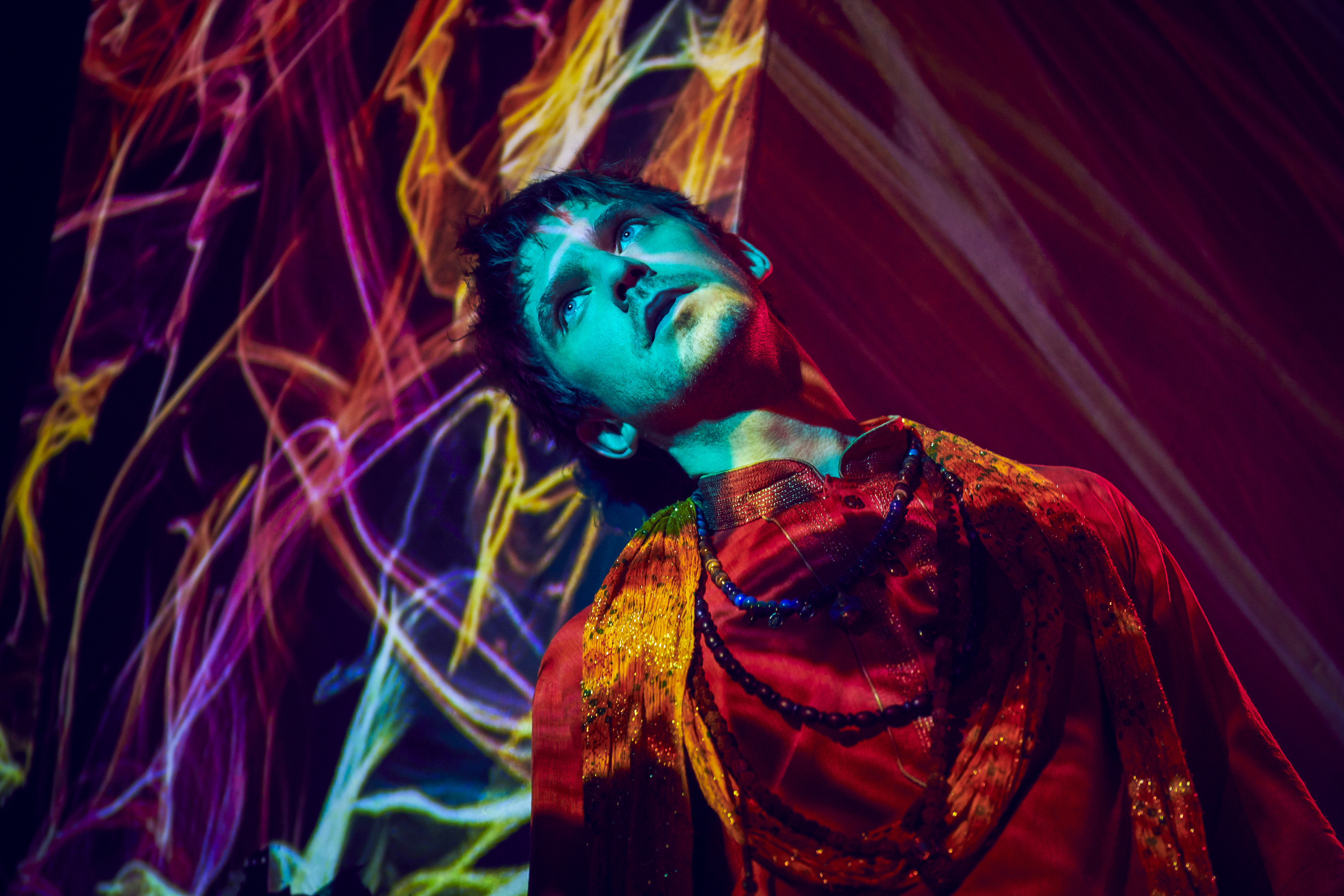Legion is a superhero story unlike any other on screen
A series that isn't afraid to get weird


A free daily email with the biggest news stories of the day – and the best features from TheWeek.com
You are now subscribed
Your newsletter sign-up was successful
The Marvel television series Legion, the third and final season of which premiers on FX Monday night, has tread ground no other popular comic book show or movie has dared to: the landscape of the mind, with all of its infinite superheroic possibilities. The result is not simply a story with more imagination, more aesthetic and narrative potential, but a comic-book hero fully drawn, with depth and nuance and a clearly illustrated sense of self in an outsized, fictional world.
When Legion premiered in 2017, it immediately distinguished itself from the usual superhero fare with its tone and aesthetic: respectively off-kilter and modish, occasionally grim though nevertheless marked by the bright psychedelic hues and patterns of the ‘70s. But what was more surprising was the show's portrayal of its unreliable protagonist, David Haller, who is stuck in a mental hospital, unsure of what's real or imagined. Season one journeyed through David's thoughts and memories, jumping back and forward in time, erasing facts, revealing details, ultimately guiding David — and the viewer — toward a true view of his abilities and the parasitic mutant who plagues him. Rather than focusing entirely on the action in the outside world, the show switched back and forth between the world at large and David's own mind, where he encounters various incarnations of the villainous Shadow King, and where he himself is temporarily trapped.
By season two, David has developed a better grasp of his abilities and uses them to have mental battles with the Shadow King; the two face off on a dance floor, have a tense mental tête-à-tête at an imaginary dinner table, and meet imagination to imagination on a constantly morphing battlefield. He ventures into the minds of his friends, who, while infected with a kind of mental malady that draws them to retreat to a "mind maze" of their own making, reveal their deepest needs and vulnerabilities and how they see the world. All of this is meanwhile interrupted by classroom-style psychology lessons on the workings of the human mind: how ideas are born, how reality is perceived. In other words, Legion isn't afraid to get weird.
The Week
Escape your echo chamber. Get the facts behind the news, plus analysis from multiple perspectives.

Sign up for The Week's Free Newsletters
From our morning news briefing to a weekly Good News Newsletter, get the best of The Week delivered directly to your inbox.
From our morning news briefing to a weekly Good News Newsletter, get the best of The Week delivered directly to your inbox.
But that weirdness is perfectly appropriate for the hero, a powerful psychic with telekinesis and a history of trauma, drug abuse, and mental illness. Why wouldn't a hero whose powers relate to the mind have the mind as his playground? And yet, it happens infrequently. The currency of the superhero media industry is usually whams, bams, beatdowns, and throwdowns. Muscle is the main attraction (think the chiseled bod of Captain America), and then gadgets (the pricey tech of Tony Stark and Bruce Wayne), technical prowess (Black Widow and Hawkeye) and then seemingly limitless magical abilities (Superman, Captain Marvel, etc.). More tricky are the superheroes whose powers are related to mental processes and perception of reality.
X-Men greats Charles Xavier and Jean Grey are two obvious examples. Over the course of several sometimes good, frequently bad, and usually mediocre X-Men movies, Xavier's powers weren't prominently featured; he presses a finger to his temple and we hear his telepathic broadcasts as dramatic voiceovers, but mostly he's shown arching his eyebrows and mentoring his students. Meanwhile, Jean, whose famous comic-book arc about her possession by a godlike force called the Phoenix was tackled in X-Men: The Last Stand, and now again in Dark Phoenix, is relegated to the category of too-powerful-and-out-of-control female character. Her destructive power, and the reactive fear of those around her, becomes the whole point, rather than her internal struggle with that power, which, in itself, is vague in its potential and scope. In a similar category is the Silver Surfer, who appeared in the 2007 Fantastic Four sequel, and whose powers — telepathy, energy manipulation, astral projection, interdimensional travel, etc. — are just barely hinted at but not shown or explained in any way. The Scarlet Witch, too, has suffered from this same predisposition of filmmakers to avoid much beyond the more straightforward punching-and-kicking heroes. A powerful mutant who, in the comics, is the daughter of Magneto, the Scarlet Witch can both manipulate minds and also alter reality. But in the Avengers movies, the character is limited to telekinesis via nondescript blasts of red light. Though Avengers: Infinity War or Avengers: Endgame seemed as though they would present the perfect opportunity for Scarlet Witch to unleash her full universe-altering powers, it was not so.
Part of the issue, in the case of the Scarlet Witch and the Silver Surfer at least, is that these characters don't have their own movies in which to shine. A filmmaker needs the proper length of time to explain these abilities, to build up the world so that it can then be broken down by these characters and their abilities. Doctor Strange gets the closest, and it's no coincidence that the film has the most eye-grabbing special effects of the Marvel Cinematic Universe. The Doc games in the astral plane and the Mirror Dimension, changing matter, space, and time.
The source material for these properties, comic books, had more fun with the representation of psychic and other mind-manipulating heroes; Professor X regularly went for jaunts in his astral form and, in New Mutants, he fights David (who was originally written as Xavier's son) on an ever-changing psychic plane. There are limits, of course, to the movie form itself. One of the primary reasons Legion can more closely resemble the deep storytelling of comic books is that, as a television series, there's simply more space for narrative invention, more room for these heady concepts to breathe.
A free daily email with the biggest news stories of the day – and the best features from TheWeek.com
And that isn't to say that every superhero film or TV show needs to be the Marvel or D.C. equivalent of Inception — because that approach overwhelms even Legion on occasion. But what the show also brings is a degree of interiority to its hero that's typically unmatched in other shows and movies. It's a product of the show's approach, that we spend so much time moving through David's mind, that we get to know him intimately — his traumas, his emotional reactions, his fears, firsthand, and in close proximity to all of it. We're presented with the space with which to interrogate David's perception of his place in the world, or, rather, worlds — the world of "regular" people and the world of mutants. It's an example of a property going for a different kind of hero and building a world around him that's best suited to highlight his character and abilities.
Just like any other genre, superhero stories shouldn't be one-size-fits-all. Legion proves that a more out-of-the-box approach to aesthetic, narrative, and perspective can offer so much more, and that superpowers don't always mean muscles.
Maya Phillips is an arts, entertainment, and culture writer whose writing has appeared in The New York Times, Vulture, Slate, Mashable, American Theatre, Black Nerd Problems, and more. She is also a web producer at The New Yorker, and her debut poetry collection, Erou, is forthcoming in fall 2019 from Four Way Books. She lives in Brooklyn.
-
 The environmental cost of GLP-1s
The environmental cost of GLP-1sThe explainer Producing the drugs is a dirty process
-
 Greenland’s capital becomes ground zero for the country’s diplomatic straits
Greenland’s capital becomes ground zero for the country’s diplomatic straitsIN THE SPOTLIGHT A flurry of new consular activity in Nuuk shows how important Greenland has become to Europeans’ anxiety about American imperialism
-
 ‘This is something that happens all too often’
‘This is something that happens all too often’Instant Opinion Opinion, comment and editorials of the day
